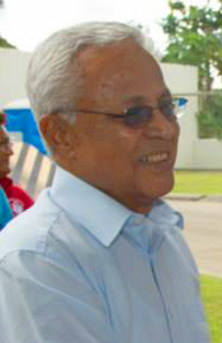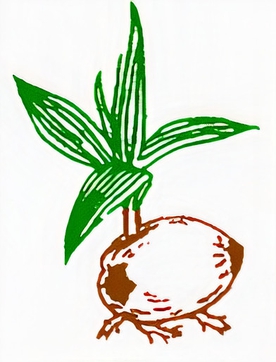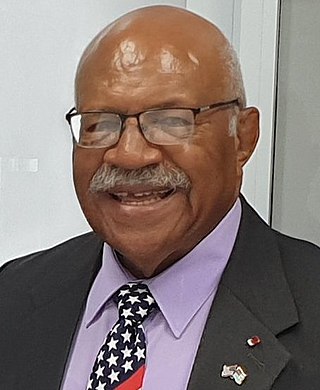
Mahendra Pal Chaudhry is a Fijian politician and the leader of the Fiji Labour Party. Following a historic election in which he defeated the long-time former leader, Sitiveni Rabuka, the former trade union leader became Fiji's first Indo-Fijian Prime Minister on 19 May 1999, but exactly one year later, on 19 May 2000 he and most of his Cabinet were taken hostage by coup leader George Speight, in the Fiji coup of 2000. Unable to exercise his duties, he and his ministers were sacked by President Ratu Sir Kamisese Mara on 27 May; Mara intended to assume emergency powers himself but was himself deposed by the military leader, Commodore Frank Bainimarama.

The Fiji Labour Party, also known as Fiji Labour, is a political party in Fiji. Most of its support is from the Indo-Fijian community, although it is officially multiracial and its first leader was an indigenous Fijian, Dr. Timoci Bavadra. The party has been elected to power twice, with Timoci Bavadra and Mahendra Chaudhry becoming prime minister in 1987 and 1999 respectively. On both occasions, the resulting government was rapidly overthrown by a coup.

The United Fiji Party was a political party in Fiji. It was founded in 2001 by Prime Minister Laisenia Qarase as a power base; it absorbed most of the Christian Democratic Alliance and other conservative groups, and its endorsement by the Great Council of Chiefs (Bose Levu Vakaturaga) caused it to be widely seen as the successor to the Alliance Party, the former ruling party that had dominated Fijian politics from the 1960s to the 1980s. It drew its support mainly from indigenous Fijiians.

Sitiveni Ligamamada Rabuka is a Fijian politician who has served as Prime Minister of Fiji since 24 December 2022. He was the instigator of two military coups in 1987. He was democratically elected as Prime Minister of Fiji, serving from 1992 to 1999, and again in 2022, leading a three-party coalition. He also served as Chairman of the Great Council of Chiefs from 1999 to 2001, and later as Chairman of the Cakaudrove Provincial Council from 2001 to 2008.

Tupeni Lebaivalu Baba is a Fijian academic and politician, who founded the now-defunct New Labour Unity Party. Most members of this party later merged with several other centrist parties to form the Fiji Democratic Party. A former Professor of Education at the University of the South Pacific (USP), he later served as a senior research fellow at the Centre for Pacific Studies at the University of Auckland in New Zealand, from 2001 to the end of 2005. In the general election scheduled for 6–13 May 2006, Baba attempted a political comeback, this time on the ticket of the ruling Soqosoqo Duavata ni Lewenivanua (SDL), a political switch that generated a considerable degree of public discussion. Although his bid was unsuccessful, he was subsequently appointed to the Senate as one of nine nominees of the Fijian government.

General elections were held in Fiji in August and September 2001. The Soqosoqo Duavata ni Lewenivanua party won 18 of the 23 seats reserved for ethnic Fijians and one of three "general electorates" set aside for Fiji's European, Chinese, and other minorities. It also won 13 of the 25 "open electorates," so-called because they are open to candidates of any race and are elected by universal suffrage. The remaining five ethnic Fijian seats, and one open electorate, were won by the Conservative Alliance, one of whom was George Speight who had led the putsch against the lawful government the year before. Chaudhry's Labour Party won all 19 Indo-Fijian seats and eight open electorates. The New Labour Unity Party, formed by defectors from the FLP, won one general electorate and one open electorate. The three remaining seats were won by minor parties and independent candidates.

The National Federation Party is a Fijian political party founded by A.D. Patel in November 1968, as a merger of the Federation Party and the National Democratic Party. Though it claimed to represent all Fiji Islanders, it was supported, in practice, almost exclusively by Indo-Fijians whose ancestors had come to Fiji between 1879 and 1916, mostly as indentured labourers. However, in the 2018 general election, the party recorded a considerable change in its support base due to the inclusion of more indigenous Fijian candidates.

The National Alliance Party of Fiji (NAPF) was a Fijian political party. It was formally registered on 18 January 2005 by Ratu Epeli Ganilau, as the claimed successor to the defunct Alliance Party, which ruled Fiji from 1967 to 1987 under the leadership of the late Ratu Sir Kamisese Mara, Ganilau's father-in-law. Others involved with the party included university lecturer Meli Waqa as party secretary, and Manu Korovulavula as treasurer. The Deputy Leader was Hirdesh Sharma. The party was launched publicly at a mass rally in Suva on 8 April 2005.

The United Peoples Party was a minor political party in Fiji. It represented mainly General Electors and multiracial people, and claimed to follow moderate, centrist policies. From 2001 it was led by Mick Beddoes, the sole member elected from the party to the 71-member House of Representatives in the general election.

General elections were held in Fiji between 6 and 13 May 2006.

Local elections were held in Fiji on 22 October 2005 to elect the councils of eleven municipalities. In Suva, the elections for the Suva City Council were postponed until 12 November due to the death of two candidates; the death of a candidate in Lautoka also resulted in the postponement of the poll in one of the four wards.

Krishna Datt, last name sometimes spelt as Dutt, is a Fijian politician of Indian descent. Datt served as Principal of Suva Grammar School, where he participated in the national teachers' strikes in 1985, which launched his political career with the Fiji Labour Party.
Dr Gunasagaran Gounder is a Fiji Indian medical doctor who, as a Fiji Labour Party candidate, defeated the Leader of Opposition, Jai Ram Reddy of the National Federation Party, in the contest for the Yasawa Nawaka Open Constituency seat in the 1999 general election. He was subsequently appointed Assistant Minister for Health in the Peoples Coalition Government led by Mahendra Chaudhry from 1999 to 2000.
Gyani Nand was a Fijian politician of Indian descent. He was born in Tavua and taught in a number of primary and high schools then worked as a hansard reporter and later as a diplomat in Australia and England before starting his political career.
Dr Anirudh Singh is a Fiji Indian academic who has undertaken research on muon implantation in solids but is best known for the stand he has taken on national issues, in particular those relating to social inequities in Fiji, resulting from the 1987 military take-over of the Fijian Government.
Davendra Singh was a Fiji Indian small businessman and politician who came into prominence when he challenged and defeated the official National Federation Party (NFP) candidate in a by-election in March 1985.
Attar Singh is a Fijian trade unionist of Indian descent. As of January 2007, he is the General Secretary of the Fiji Islands Council of Trade Unions (FICTU), one of two major umbrella bodies for trade unions in Fiji.
Balwant Singh Rakkha was a Fiji Indian medical doctor and a member of the House of Representatives of Fiji representing the National Federation Party (NFP), but he is best known for his strong support for the former leader of the NFP, Sidiq Koya and the split caused within the NFP when he was rewarded by Koya for his loyalty by being given a seat in a constituency where he was a virtual unknown.
Jale Baba in Lautoka is a Fijian businessman and political organizer. A forestry graduate of the Australian National University, he worked for Fiji Pine Limited for more than 20 years, before leaving in 1999 to start his own company- Baba Forests. He also serves as the campaign director of the ruling Soqosoqo Duavata ni Lewenivanua Party, or SDL). He was General Secretary and more recently National Director of the party, but relinquished this post on 1 January 2006 in order to take charge of the campaign for the general election to be held from 6–13 May.

General elections were held in Fiji on 14 December 2022 to elect the 55 members of Parliament. The elections took place following the passage of controversial electoral amendments.







